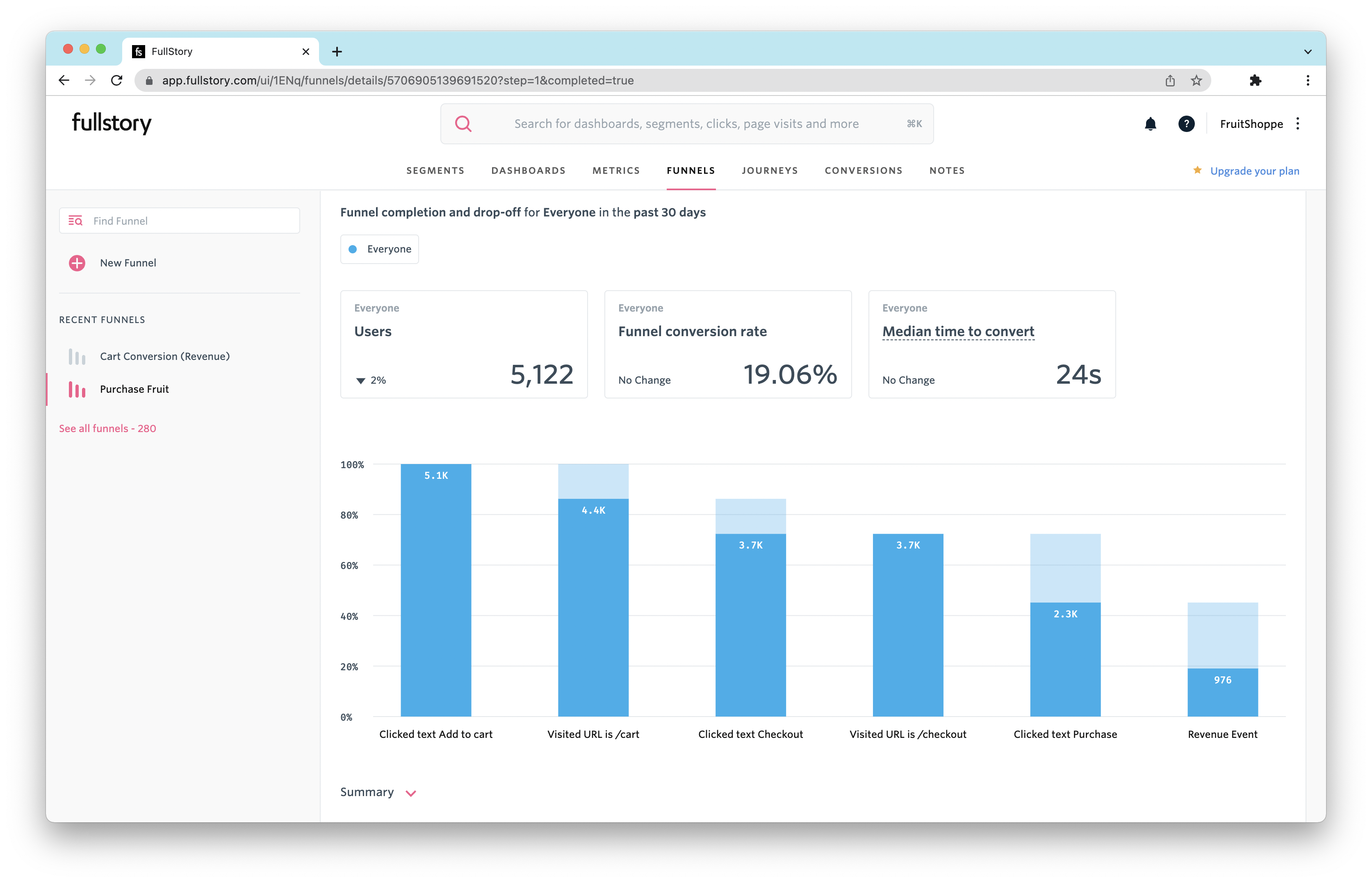
FullStory: Complete Buyer's Guide
Definitive behavioral analytics platform for ecommerce businesses
FullStory positions itself as the definitive behavioral analytics platform for ecommerce businesses seeking to eliminate revenue leakage through AI-powered customer journey optimization. The platform combines high-fidelity session replay capabilities with Google's Gemini LLM to deliver automated behavioral insights that directly address the industry's persistent 68% cart abandonment challenge[39][42][56].
Market Position & Maturity
Market Standing
FullStory operates within a three-tier competitive landscape consisting of enterprise platforms (Amplitude, Mixpanel), specialized AI tools (Bloomreach, Rep AI), and embedded solutions (Shopify AI), positioning itself as a behavioral analytics specialist between enterprise leaders and emerging AI-native solutions[47][48].
Company Maturity
Company maturity indicators demonstrate operational scale through documented capability to process 350,000 sessions monthly and serve enterprise customers including JetBlue, Lowe's, and MOO across diverse implementation scenarios[43][50][52].
Growth Trajectory
Growth trajectory evidence includes expanding customer base across enterprise and mid-market segments, with documented success stories spanning multiple industries and implementation scales[50][51].
Industry Recognition
Industry recognition includes Forrester's Total Economic Impact study documenting 411% ROI over three years, providing third-party validation of business value proposition[54][55].
Strategic Partnerships
Strategic partnerships include integration with Google's Gemini LLM for StoryAI capabilities, positioning FullStory within the broader Google AI ecosystem while maintaining platform independence[44][45].
Longevity Assessment
Longevity assessment supports continued operation through established customer base, proven technical capabilities, and strategic positioning within the growing behavioral analytics market[44][45][52].
Proof of Capabilities
Customer Evidence
Enterprise customer validation demonstrates FullStory's effectiveness across major implementations. JetBlue achieved $1 million annual savings through payment error reduction and improved resolution processes[43][52]. Lowe's implementation identified 83% of fraudulent checkouts using behavioral detection capabilities[52].
Quantified Outcomes
Quantified performance outcomes demonstrate measurable business impact across multiple optimization scenarios. Forrester's Total Economic Impact study documents 411% ROI over three years with sub-3-month payback periods for specific use cases[54][55].
Case Study Analysis
Mid-market success evidence includes MOO's measurable outcomes: 29% reduction in checkout drop-offs combined with 67% error decrease through behavioral optimization insights identified by FullStory's AI-powered friction detection[52].
Market Validation
Market adoption indicators span diverse industry verticals including airlines (JetBlue), home improvement retail (Lowe's), online printing (MOO), and ecommerce (Kogan), demonstrating platform versatility across different business models and customer journey complexities[43][52].
Competitive Wins
Competitive validation emerges through customer retention and expansion, with documented enterprise customers maintaining long-term implementations and achieving sustained business value[43][52].
Reference Customers
Enterprise customers include JetBlue, Lowe's, and MOO, demonstrating market acceptance and operational reliability across diverse industry verticals[43][52].
AI Technology
FullStory's technical foundation centers on StoryAI, their behavioral intelligence engine powered by Google's Gemini LLM, which automates previously manual analysis tasks and reduces multi-session analysis time from hours to minutes[44][45].
Architecture
Architecture and deployment leverage cloud-native infrastructure with batch processing capabilities, though this creates latency compared to real-time stream processing offered by competitors like Amplitude[47].
Primary Competitors
Primary competitive landscape positions FullStory within a three-tier market structure: enterprise platforms (Amplitude, Mixpanel), specialized AI tools (Bloomreach, Rep AI), and embedded solutions (Shopify AI)[47][48].
Competitive Advantages
Competitive advantages center on session replay fidelity combined with AI-powered analysis, where customer reviews consistently highlight superior session replay quality compared to alternatives[49][52].
Market Positioning
Market positioning strategy targets the gap between enterprise analytics platforms and specialized AI tools, serving organizations that need comprehensive session replay combined with intelligent analysis rather than standalone predictive capabilities[47][48].
Win/Loss Scenarios
Win/loss scenarios favor FullStory for organizations prioritizing immediate behavioral insights over predictive analytics capabilities, particularly those requiring high-fidelity session replay for detailed customer experience analysis[44][45][49][52].
Key Features

Pros & Cons
Use Cases
Integrations
Pricing
Featured In Articles
Comprehensive analysis of Product Analytics for Ecommerce for Ecommerce businesses and online retailers. Expert evaluation of features, pricing, and implementation.
How We Researched This Guide
About This Guide: This comprehensive analysis is based on extensive competitive intelligence and real-world implementation data from leading AI vendors. StayModern updates this guide quarterly to reflect market developments and vendor performance changes.
56+ verified sources per analysis including official documentation, customer reviews, analyst reports, and industry publications.
- • Vendor documentation & whitepapers
- • Customer testimonials & case studies
- • Third-party analyst assessments
- • Industry benchmarking reports
Standardized assessment framework across 8 key dimensions for objective comparison.
- • Technology capabilities & architecture
- • Market position & customer evidence
- • Implementation experience & support
- • Pricing value & competitive position
Research is refreshed every 90 days to capture market changes and new vendor capabilities.
- • New product releases & features
- • Market positioning changes
- • Customer feedback integration
- • Competitive landscape shifts
Every claim is source-linked with direct citations to original materials for verification.
- • Clickable citation links
- • Original source attribution
- • Date stamps for currency
- • Quality score validation
Analysis follows systematic research protocols with consistent evaluation frameworks.
- • Standardized assessment criteria
- • Multi-source verification process
- • Consistent evaluation methodology
- • Quality assurance protocols
Buyer-focused analysis with transparent methodology and factual accuracy commitment.
- • Objective comparative analysis
- • Transparent research methodology
- • Factual accuracy commitment
- • Continuous quality improvement
Quality Commitment: If you find any inaccuracies in our analysis on this page, please contact us at research@staymodern.ai. We're committed to maintaining the highest standards of research integrity and will investigate and correct any issues promptly.